

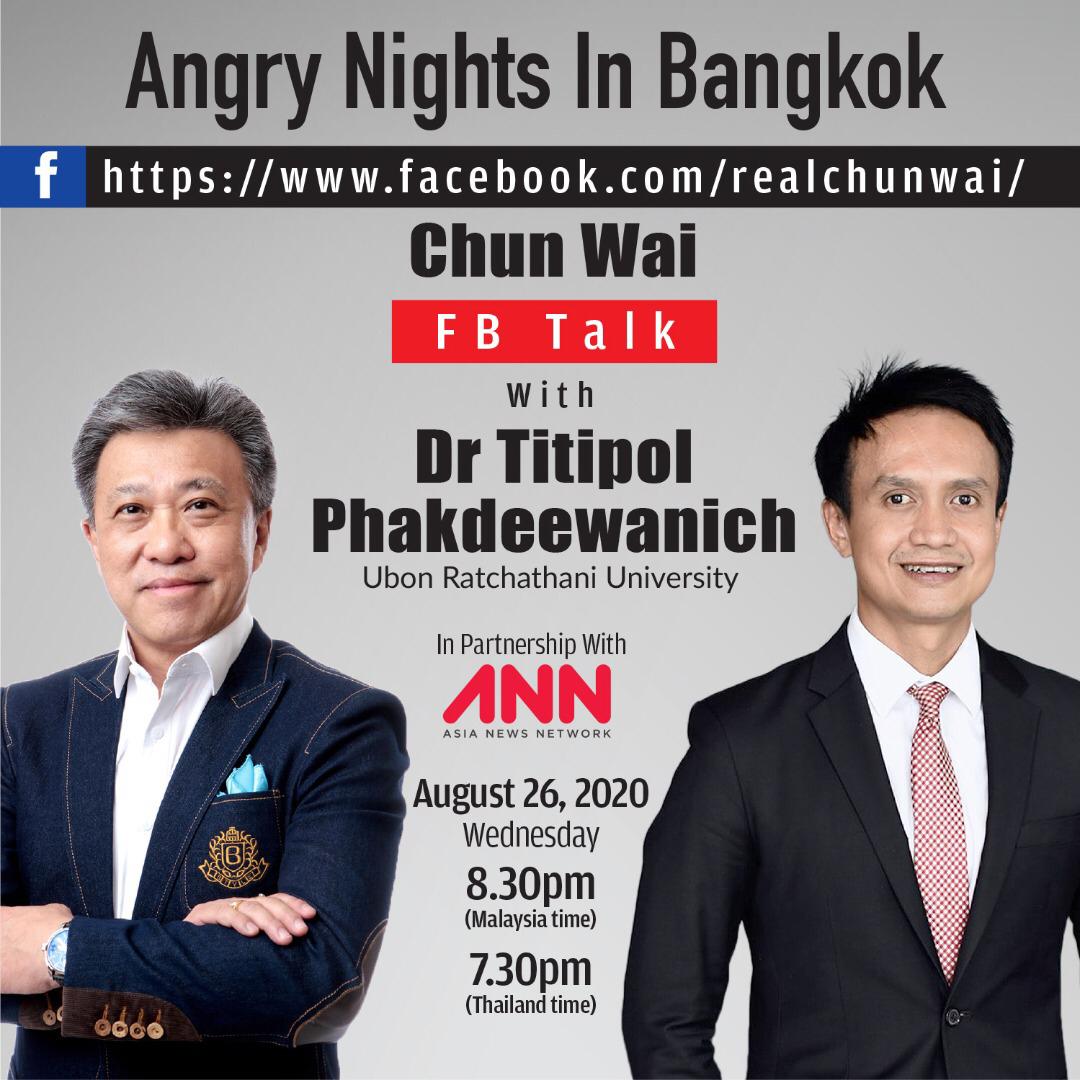
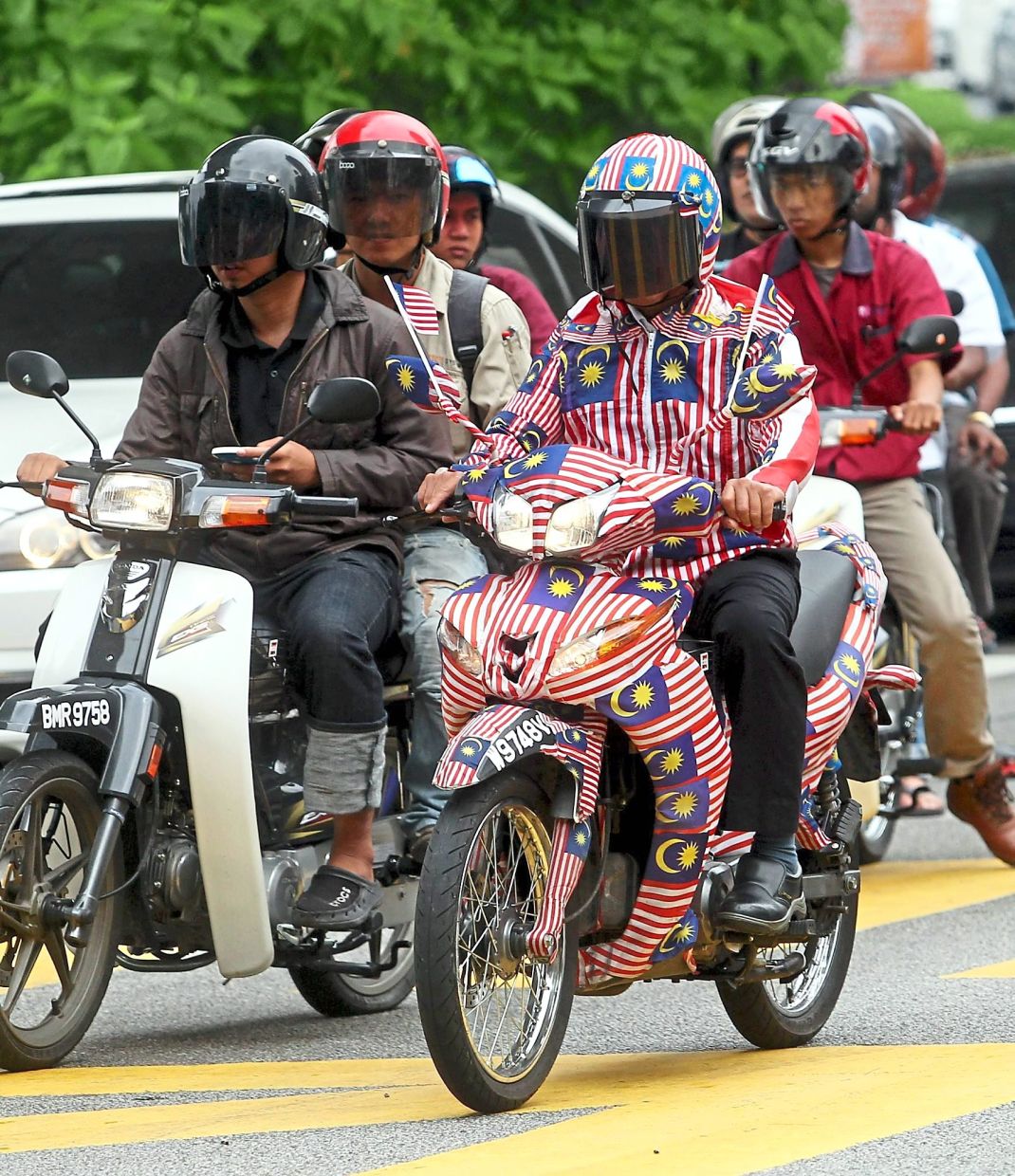
Stay safe: This National Day, we need to remember not only our face masks when biking around but also our helmets.
Lives lost and families destroyed are everyday scenery here. And they’re all paid for the price of ignoring basic safety rules.
IT’S barely news that our politicians are cavalier about wearing helmets when riding motorcycles, especially in rural areas.
But let’s not pretend that only politicians from the government are culprits because bad examples proliferate in both sides of the divide. In fact, if there’s one thing that binds them all, it’s flouting the law.
Last week, former Transport Minister Anthony Loke Siew Fook said he had pictures of Umno leaders, including ex-prime minister Datuk Seri Najib Razak, riding without a helmet.
Loke also claimed that Datuk Seri Ahmad Zahid Hamidi (BN-Bagan Datuk), Datuk Seri Reezal Merican Naina Merican (BN-Kepala Batas) and Tan Sri Annuar Musa (BN-Ketereh) had done the same, showing several pictures as proof.
Barely after 24 hours later, MCA central committee member Datuk Chew Kok Woh showed the media top PKR and Amanah leaders on motorbikes without helmet. These included Amanah president Mohamad Sabu and PKR Secretary General Saifuddin Nasution.
Chew also posted pictures of DAP assemblyman Ng Sze Han on his motorbike without a helmet.
Many politicians – presently or formerly in government – seem to think that when they’re in villages, they can ride their motorbikes without helmets, just like their supporters. Granted, village trails aren’t thoroughfares, which is why these politicians think it’s excusable not to wear protective gear.
But none of these politicians and their village supporters are aware or care that more than 60% of motorcycle fatalities happen in rural settings.
This may be surprising, but it’s true that less fatalities are registered in the cities. However, these motorists in villages were neither drunk nor intoxicated.
Drink driving, which has led to fatal accidents, are emotional matters because they often involve people of different races and religions.
Ultimately, facts and figures speak for themselves. For a start, let’s remind ourselves of a few records achieved by our motorists.
Malaysia has the highest road accident death rate in Asean and the third highest in Asia. The World Health Organisation’s 2013 statistics portrayed Malaysia among the emerging countries with the riskiest roads after Thailand and South Africa.
Malaysia registered a death rate of 23 per 100,000 population. Based on these statistics against the estimated population of 30 million, 7,000 to 8,000 people in the country die on our roads every year. And more than 50% of road accident fatalities involve motorcyclists.
According to findings by the International Association of Traffic and Safety Sciences (IATSS), the highest number of motorcycle fatalities occur in rural locations (61%), primary roads (62%) and straight road sections (66%).
“The majority are riders (89%), 16 to 20 years old (22.5%), and 90% of the motorcycles are privately owned.
“Of those involved in fatal accidents, 75% of the motorcyclists wear helmets, and 35% do not have proper licences.
“The highest number of fatalities by type of collision is ‘angular or side’ (27.5%).
“Only fatality data are used due to the severe underreporting of severe injuries (up to 600%) and slight injuries (up to 1400%).”
Although the study was done in 2012, the pattern has barely changed in recent years.
In 2019, it was reported that there were more than 280,000 road accidents recorded nationwide during the first six months of the year.
Bukit Aman Investigation and Traffic Enforcement director, Datuk Azisman Alias said that between January to June 2019,281,527 accidents were reported in the country. This number is a 2.5% increase from 2018, which saw 274,556 accidents in the same period.
Malaysian motorcyclists are the biggest culprits, and victims, too. They account for two-thirds of road crash fatalities and sadly, the majority are teenagers.
These are the ones who consider wearing helmets optional. Let’s not even talk about the faithful who travel to mosques for Friday prayers without road safety protection.
And it’s not uncommon to see motorcyclists with busted rear lights, too.
Then, there are the food deliverers who are notorious for beating traffic lights.
If comprehensive surveys are done at traffic lights, it’ll likely show that almost all food deliverers and many general motorcyclists, can’t obey simple traffic rules. They are not repeat offenders either, but routine ones.
The IATSS study was based on data collected and analysed from the police, government authorities, and national and international research institutes.
It found that fatal motorcyclist crashes mostly involve “passenger cars” (28%); motorcyclists are responsible for 50% of the collisions either by crashing singly (25%) or with other motorcyclists (25%). While male motorcyclists predominate (94% of fatalities), female motorcyclists aged 31 to 70, possessing “no licence” and not wearing helmets, account for a higher percentage than male motorcyclists.
The study recommends Malaysia acquire more motorcycle exposure data and establish an injury recording system and database based on hospital records.
“To reduce motorcycle fatalities, it first has to understand why young male motorcyclists are prone to fatal crashes in the evenings and on weekends on rural primary roads, especially on straight road sections.”
Well, it’s not too difficult to reason why these accidents occur in rural areas where street lighting is poor and trunk road conditions aren’t the best.
Of course, the villagers still refuse to wear helmets. In their logic, why would they need to wear a helmet for a coffee at the warung (food stall) or a spot to lepak (loaf)?
Besides, the Yang Berhormat who comes to the villages on his constituency visits, especially this National Day, won’t bother putting on one anyway.
With that said, put up the mini national flags on your bikes, by all means, but for goodness sakes, wear helmets, and face masks, too.
Stay safe, and Happy National Day.


I’M not one for heartbreak movies. In fact, I can’t fathom the idea of sitting in a cinema bawling away and drawing unwanted attention to my sensitive side.
My idea of going to the cinema is to be entertained – and this means either being in stitches over some comedy or watching heroes blast villains away. Cinema tickets aren’t the pittance they used to be, so why pay for sorrow? Life is already overflowing with pain and sadness.
Not too long ago, while on a long-haul flight, I watched Still Alice, starring Julianne Moore as a linguistic professor diagnosed with Alzheimer’s disease shortly after celebrating her 50th birthday.
It depicted a phenomenally successful, family-oriented woman who literally began to lose every-thing, particularly her memory. The health setback put her in a place where she simply felt lost.
At the end of the movie, I slipped into the washroom and broke down. I cried my eyes out.
I was thinking of my father, who had dementia then. He no longer recognised me and only talked about his formative years in Langkawi, Kedah.
He passed away in July, at 95 years old. What an incredible run. My mother is 89 and still has a sharp memory, especially when it comes to money and bank deposits. I’m touching 60, and like many people my age, I remember events we like to think about but can’t recall simple details.
Last week, I cried again after watching a video which truly stirred my emotions.
The video featured 10 Covid-19 survivors and frontliners. They’re not professional actors like those featured in National Day commercials we like to watch every year.
They are of all races and all are Malaysians. Covid-19 is colour blind, and for some of us who are still racially biased, this video is a stirring reminder that we don’t get to choose the ethnicity of our frontliners. Indeed, when we’re at the hospital, at the mercy of our creator, we realise that we’re barely a grain of sand or drop in the ocean.
All the titles, wealth and self-glorification are useless. We want the best doctors and nurses and, finally, we realise that their race and religion don’t matter in the name of caregiving.
In just five days, the 10-minute video was viewed nearly 800,000 times on Facebook and Instagram, with over 25,000 shares and hundreds of positive comments. It has been shared around the world, especially among the Malaysian diaspora, and the numbers are still flying as the video continues to soar with its viewership.
The R.AGE team of Star Media Group has produced many internationally award-winning videos, but this one has tugged the most at my heartstrings.
I guess it hit most of us directly because we can all relate to it. It’s also the timing of the video. We are still battling the pandemic, and while Malaysia has done well in containing the spread of the disease, we have also slipped into complacency.
It’s nearing National Day, and on this occasion, we need to remind ourselves that we’re Malaysians and this country belongs to all of us, regardless of race.
Many of our forefathers came by different ships, but as Malaysians, we’re now in the same boat, charting a course through difficult economic times.
Our politicians are compelled to paint a rosy picture of Malaysia ahead of the general election, but things can only get rougher. We’ve had enough politicians promising us so many things in their manifesto only to falter in fulfilling them. Worse is them having the gall to say they never thought they could win.
The real heroes are not these vote and publicity seeking politicians with superb acting talents but Malaysians performing their duties with great dedication and even risking their lives daily.
The R.AGE team searched for Covid-19 survivors, encountering apprehension from some initially. With the frontliners, it was more difficult because their jobs were the priority. Appearing in front of the camera was understandably uncomfortable, although it was easier for the younger ones who grew up in the age of Instagram and TikTok.
Said Qalbie Ghani, who was treated at Tumpat Hospital, Kelantan, for 15 days: “Even if I saw (my doctors) on the street, I wouldn’t be able to recognise them because they were in full PPE (personal protective equipment),” she said.
Qalbie was one of the 10 Covid-19 survivors who shared their harrowing experience and their heart- warming tributes to the frontliners in Reunited.
“They treated us with such care. In fact, I think Malaysian Covid-19 patients are lucky because we have such dedicated frontliners,” she said.
The video ends with an emotional surprise for each survivor – which R.AGE deputy executive producer Ian Yee was quick to remind us not to divulge as a spoiler.
“We’ve worked hard to keep the surprise under wraps for a few weeks because we hope people can experience it themselves when they watch the film,” said Yee, who warned that “there will be tears”.
He added that it took the R.AGE team three months and “countless phone calls” to find the right profiles for the film as well as orchestrate the emotional surprise, which they only had one shot to get right.
There are other incredible stories, too. A friend of mine had to be quarantined on his return from Australia. He was naturally concerned about the quality of the hotel he was placed in. But to his surprise, he found himself in a comfortable one in Kuala Lumpur and in his words, “for the first time, I had a police escort for our bus from KLIA to KL”.The Covid-19 tests were also quickly carried out; as he checked into the hotel, though, he realised he didn’t have some important medication with him. The next day, he expressed his anxiety to the frontliners and, to his pleasant surprise, it was delivered to his room from a government hospital at no charge.
Many of us, especially urbanites, are often critical of our countrymen and institutions but the pandemic has shown that Malaysians are able to rise to the challenges.
EcoWorld collaborated with R.AGE to produce Reunited for its #AnakAnakMalaysia campaign with Star Media Group. The annual campaign celebrates Malaysia’s strength in unity and diversity, and usually culminates with the popular #AnakAnakMalaysia Walk.
“Although we can’t have our usual #AnakAnakMalaysia walk this year, the spirit of unity continues to resonate in this year’s campaign.
“Our theme of ‘Bersama Demi Generasi Masa Depan’ reminds us that sustaining a community for generations to come is a collective effort by all,” said Datuk Chang Khim Wah, president and CEO of Eco World Development Group Bhd.
Ordinary Malaysians are rarely at odds with each other. In fact, because there is no tension between us, we are comfortable with one another.It’s the politicians who stoke the fires of controversy and create imaginary enemies of us.
I’ve received many calls and text messages from friends about Reunited but the best came from our fellow moderation advocate and good friend Lyana Khairuddin who texted: “Why lah Star make us cry… but for the right reason.”
Lest we forget, Tunku Abdul Rahman said, “I am nothing without my country and my fellow Malay-sians”.
This certainly seems like a timely reminder for some politicians who still have an inane sense of self-importance and have no time for the people once they are elected.
Watch the video:
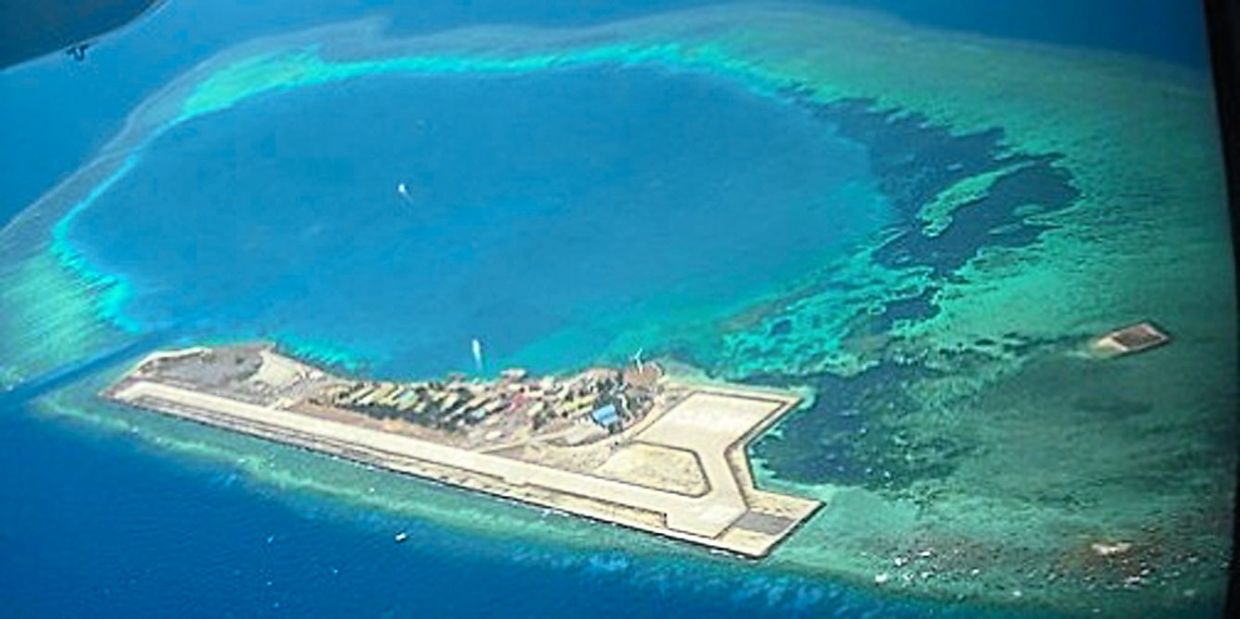
Home territory: Malaysia maintains a naval presence on the disputed Pulau Layang Layang, which also houses a resort that is popular with scuba divers. — Photos: Filepics/The Star
As tensions in the South China Sea escalate between the United States and China, it’s crucial we stay out of their bitter feud.
DESPITE the continuous news reports of the South China Sea being a flash point between the United States and China, most Malaysians would regard the place remote, if not inconsequential.
Most of us have greater concerns than the complex overlapping claims by many countries on the disputed islands there.
It’s highly unlikely that the bulk of us would be able to put our finger on the map where these purported fights between the two superpowers could break out.
But it isn’t really that far from our backyard. Pulau Layang Layang, which is part of the Spratly Islands, is a mere 300km north-west of Kota Kinabalu.
Pulau Layang Layang is just a speck in the sprawling archipelago of the South China Sea’s numerous islands, cays, islets and reefs.
The atoll, which is barely 7km long and 2km wide, is under Malaysia’s administration, meaning we call the shots.
Other countries, including China, Taiwan and Vietnam, call this island by different names and claim it’s theirs, too. The Philip-pines has claimed part of the Spratly Islands as its territory as well.
China uses an imaginary nine-dash line to cover most parts of the South China Sea, per its historic claim, which overlaps with the takes of Brunei, Indonesia, Malaysia, the Philippines, Taiwan and Vietnam.
Besides the presence of the Royal Malaysian Navy and staff of a resort, there is little else there.
I had the privilege of visiting Pulau Layang Layang in 2008 with a group of Malaysian journalists to see what the island was like and get an aerial view of the area.
The South China Sea claims have become increasingly unsettling because China has strengthened its presence there by building artificial islands with military installations in parts of the vast sea.
One-third of the world’s maritime shipping reportedly passes through it, carrying over US$3tril (RM12.5tril) in trade each year.
The region is said to have huge oil and gas deposits under its seabed as well as bountiful fish harvests, comprising about 12% of global fish catch, which is why it’s not surprising that over half of the world’s fishing vessels go there, reports reveal.
It’s almost impossible to regulate fishing in the South China Sea because of the overlapping territorial and maritime disputes, which prevent effective enforcement of the countries there.
More significantly, the South China Sea is also a strategic military spot, and the United States is accusing China of having added 1,300ha of land on various reefs, which China has denied.
But what should worry many of us in Asean is that the United States and China have ominously chosen this spot as their battle ground, albeit they are still only at the rhetoric level.
Washington declared earlier this month that Beijing’s claims to most of the sea are illegal, ramping up support for South-East Asian nations with claims to parts of it.
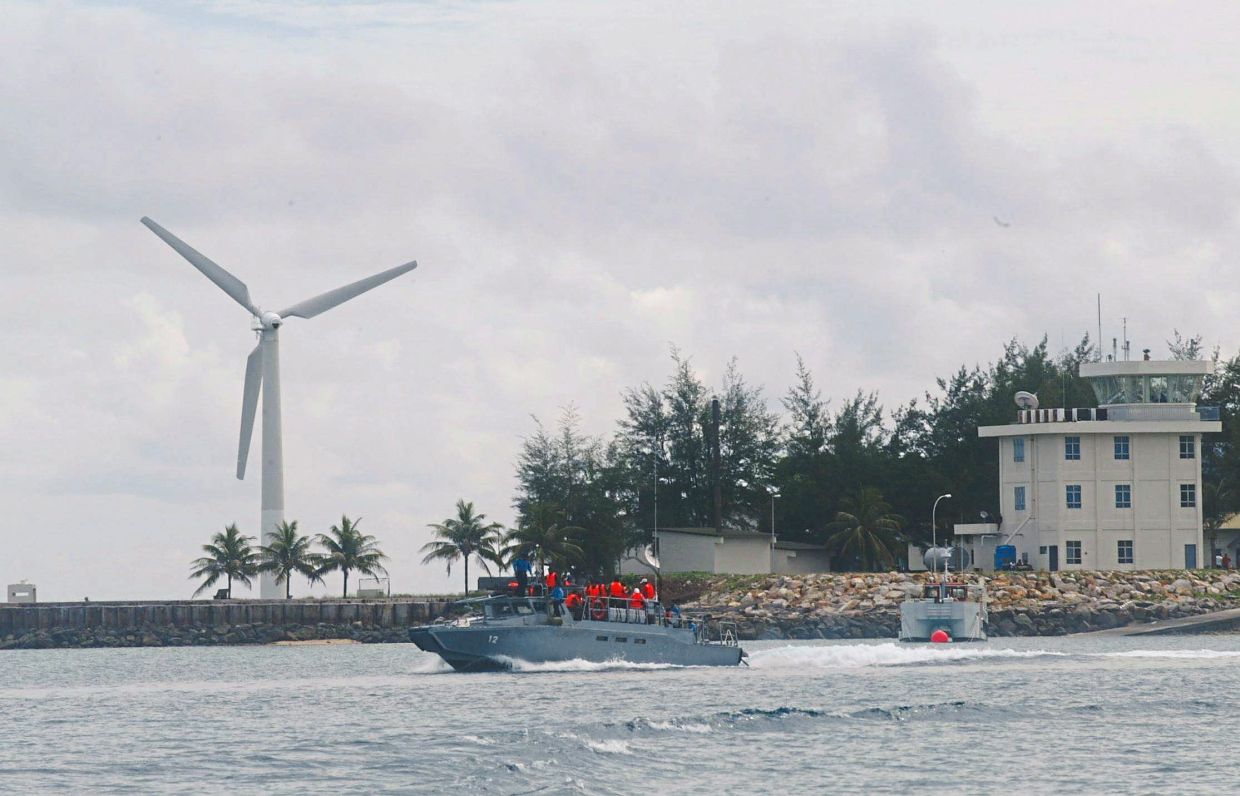
A Royal Malaysian Navy fast patrol boat speeds off from Pulau Layang Layang. The wind turbine supplies additional electrical power to the navy base on the island.A Royal Malaysian Navy fast patrol boat speeds off from Pulau Layang Layang. The wind turbine supplies additional electrical power to the navy base on the island.
Australia, which has no reason to be involved, has also rejected Beijing’s territorial and maritime claims, saying there is “no legal basis” to several of them.
The United States regularly conducts so-called “freedom of navigation operations” in the South China Sea to stand up to Beijing, in which the US Navy sometimes sends warships to the contested waters.
Recently, it was reported that China conducted rigorous naval exercises in the area using its H-6G and H-6J jet bombers. Its Defence Ministry said China carried out “high-intensity training and completed day and night training exercises in taking off and landing, long-range assault, and attacks on sea targets”.
The United States also recently sent two nuclear-powered supercarriers, the Japan-based USS Ronald Reagan and USS Nimitz, to carry out operations and exercises there with the aim “to support a free and open Indo-Pacific”. It was the first dual carrier drill there since 2014.
The South China Morning Post reported that the drills were “close to Guangdong and Fujian provinces”, while China had conducted naval drills and flyover missions “around Taiwan and the South China Sea”.
Malaysian Foreign Minister Datuk Seri Hishammuddin Hussein has it right in saying we must ensure we are not “dragged and trapped” in a geopolitical spat between heavyweight nations as we try to resolve these disputes. His ministry is keen on constructive resolution through “appropriate diplomatic negotiations”, but he highlighted two huge hurdles Malaysia faces.
“Firstly, I do not want Malaysia to be dragged and trapped in a geopolitical tussle between superpowers. We must prevent any unwanted incident from happening within our territorial waters. We must also prevent any military clashes in the waters between any relevant parties, ” he told Parliament, adding that the South China Sea dispute can’t be used as a source of divisiveness between Asean countries.
“If we follow the narrative and succumb to the pressure of superpowers, the potential for Asean countries to bend and take sides with certain countries will be high. When facing superpowers, we must be united, as one bloc, so that our strength will be synergised effectively, ” he said.
Our concern shouldn’t just be about China because the United States is also attempting to draw in the Asean claimants. In fact, it’s becoming clearer how some Asean members are perceived to be closer to the United States.
Asean needs to take a united stand because individually, we could never challenge the United States or China. Asean needs to remain a bloc even if member countries have overlapping claims on these islands.
These are complicated disputes that can’t be easily resolved, but Asean must never allow the South China Sea to be a battleground between the two superpowers. It’s too close for comfort and Malay-sians must wise up to the South China Sea being not far away.
There have been nerve-wracking close calls in the past where Chinese and US planes have collided, like in 2001, which caused the death of a Chinese pilot and forced the US plane to land on China’s Hainan Island, where its crew was detained.
In 1988, China and Vietnam clashed over Johnson South Reef in the Spratly Islands, which left 68 Vietnamese dead.
Tensions were defused via diplomatic channels a long time ago though, with cool heads prevailing.
However, with a US presidential election coming up, criticisms against China have become increasingly louder, while Chinese nationalism has also crystallised further.
Relations between the two nations are at its lowest ebb and hardly a day passes without a verbal attack by the United States.
The Americans have a history of waging war overseas. They’ve lost on occasion, but in all scenarios, every party suffered dearly. When the United States issues tough economic sanctions against other countries, the people of that country are directly hit. Case in point: Iran. Iranians can’t travel freely and aren’t allowed to even open a simple bank account anywhere.
The bottom line is, there’s a heavy price to pay for standing up to Uncle Sam.
Last week, China told its service personnel “not to fire the first shot” as Beijing looks to de-escalate tensions with the United States in the South China Sea, sources familiar with the situation told the South China Morning Post.
It would be tactically wrong for Beijing to give in to the American hawks and allow the situation to escalate.
The news report, quoting sources, said Beijing had ordered pilots and naval officers to exercise restraint in the increasingly frequent stand-offs with US planes and warships.
“Meanwhile, further details have emerged about a phone conversation between the two countries’ defence ministers last week.
“The call was first suggested by the US side about ‘a month earlier’ but was initially given a frosty reception in Beijing. But a source said the Chinese leadership later had a change of heart and decided to reach out as tensions escalated in the South and East China seas, ” the paper reported.
In fact, China perhaps needs to review its diplomatic strategy because it needs to reflect on its impact and how it’s perceived, particularly in the West.
China obviously feels it has the right to be a bigger player on the global stage having earned its stripes. However, its increasing assertiveness has been used against the country even though it has never waged war against anyone, unlike the United States.
The United States and its Western allies must also accept that the world has changed. They must accommodate China, whether they like it or not.
The nations will ultimately do as they please, but let’s hope they keep their battle out of our backyard, the South China Sea, because the situation looks explosive and ground zero is simply too close to home.
THE imagery for those of us weaned on American-made westerns is clear – the good guys were always the cowboys. The white men, I mean.
And in Hollywood’s typical black and white storyline model, the bad guys were naturally the Red Indians, who were portrayed as uncivilised savages who killed cowboys freewheelingly.
As schoolkids watching these movies, we had no idea the saddled and booted cowboys stole the Red Indians’ land.
We even cheered for Lone Ranger and his Red Indian sidekick, Tonto. It was only later that I realised Tonto was really a traitor to his fellow native Americans. Let’s be honest, the Native American snitched for him.
And of course, Lone Ranger had to be the boss. After all, he was the white man, so there was no way the Caucasian American audience would stomach their kind playing second fiddle.
When Italian moviemakers began producing western movies, dubbed spaghetti westerns, it was the Mexicans’ turn to be the bad guys. They were made to look overweight, scruffy and dirty.
Then in the late 1960s, at the height of the Vietnam war, I was delusional. I was still cheering for the American soldiers in the movies.
They were called GIs, which was a popular term to describe these soldiers. I didn’t even ask why they were called GIs. Well, GI was stamped on military assets to denote “government issue”.
I watched the 1968 movie Green Beret and was clapping away for hero John Wayne when he was killing the Vietnamese communists.
Well, recently, the late John Wayne, who played cowboys in many movies, was dismissed as a white supremacist, who had even used homophobic slurs in an interview.
I was just a kid, so how would I have known what these sweaty Americans were up to in the jungles of South-East Asia, or what business they had in our backyard? The Vietnamese in the movies were always skinny, but I was never curious to know why.
Penang was one of the listed rest and recreation spots for these American soldiers and there were many of them – usually drunk – in my hometown. They seemed like good guys and they looked like heroes. And that’s how Hollywood has brainwashed us.
In fact, American moviemakers are still at it. The Arabs must be terrorists, the Italians Mafia mobsters who kill on weekdays and confess in church for their sins on Sundays, and, curiously, only eat pizza and spaghetti.
The Irish speak English that’s not native to most. So they are often cast in a bad light by filmmakers.
In hit TV series Peaky Blinders, the Irish and Gypsy backstory make for Hollywood gold, in which, of course, the character Tommy Sheldon and his family members are gangsters.
The scourge of stereotyping has also made blacks look like gangsters, with their bling, tattoos and obligatory loud rap music as a soundtrack. You never see them as the Wall Street types in movies. Even the hero, Shaft, has to deal with black bad guys.
Then, there are the Albanians. If you’ve watched Taken (and its sequels), a movie about a retired secret service agent whose teenage daughter is abducted by human traffickers while on a trip, you will never visit Paris and Istanbul, two cities supposedly filled with these bad Eastern Europeans.
Let’s not even mention the Russians. They have been the bad guys from the day Hollywood made its first movie and little has changed to this day. The Cold War may have ended but the rivalry has never stopped.
Fast forward to 2020, and the bad guys are now the Chinese. Hollywood is still unsure of how they should treat the Communist Chinese, who supposedly eat bats and export viruses to the United States.
After all, the rich Chinese have pumped in too much money to support Hollywood movies and Tinseltown depends on China as the biggest box office in the world. So, indeed, cash is King, regardless of whether it is the US dollar or Chinese yuan. For the time being, just leave China-bashing to President Donald Trump and his sidekick, State Secretary Richard Pompeo.
With the US presidential election set for November, the two have literally gone berserk with their routine rhetoric against China.
The Chinese, and Asians who look like Chinese, have been blamed for everything under the sun.
Every Chinese is a potential spy for China. It doesn’t help that most of them are good in maths and science, lending to the spy theory. Soon, Kumon classes will be branded communist indoctrination camps designed to produce intellectual property thieves.
We can’t be too far off the mark to say 90% of Americans don’t even know where the hell the South China Sea is, yet it has become a daily topic in the American media.
None of the media, however, has pointed out that Americans have bases in South-East Asia while the Chinese have no such presence or even an outpost in any city in the region.
But the reality is that the anti-China narratives have worked in the United States and Trump is probably aware of it and has kept pushing the pitch. Never mind what CNN says because the TV station is merely the voice of the cities and not the rural Midwest where the cowboys live.
The fact is that Americans’ negative perception of China has reached a “new historic high” amid the coronavirus pandemic, according to a report published by the Pew Research Center on Thursday.
“Around three-quarters (73%) of Americans have an unfavourable view of China today – the most negative reading in the 15 years that Pew Research Center has been measuring these views,” wrote the authors of the report, Laura Silver, Kat Devlin and Christine Huang.
“The percentage who say they have a very unfavourable view of China is also at a record high of 42%, having nearly doubled since the spring of 2019, when 23% said the same.”
The South China Morning Post reported that amid repeated accusations of espionage, consulate closures in Houston and Chengdu, and continued finger-pointing in Washington and Beijing over which country deserves more blame for Covid-19, Pew’s survey is the latest piece of evidence in an impossible-to-miss trend: the distrust of China and its senior leadership, now rampant in the United States.
The survey showed that Republicans and Democrats are together in their scepticism, though the latter number slightly less.
“In March, 72% said they had a negative view of the country, compared with 62% of Democrats and Democratic leaners. Republicans are also more critical of China’s handling of the coronavirus pandemic: In the April-May survey, 76% of Republicans and Republican leaners say the country has done a bad job, compared with 54% of Democrats and leaners who say the same.
“And, while large majorities of partisans on both sides of the aisle have little or no trust in coronavirus information coming from
the Chinese government, a whopping 92% of Republicans hold this view, compared with 78% of Democrats.”
It may not be emblazoned yet, but the Americans and their allies are sitting uncomfortably with the increasing competition in all spheres from China.
The Chinese have simply become too good at the game of capitalism. China is supposed to stay poor, be subservient, only produce cheap goods for the West, and never become a competitor.
Whether it’s CNN, BBC, CNBC or Fox News, the same narrative is being put through its rinse and repeat paces. Succinctly put, China must be the bad guys, and it’s now the right time to be biased, too.
Yellow Peril is now back in fashion. The principles of free trade and fair play have been thrown out the window.
At Trump’s order, social network video sharing site Tik Tok was blackmailed into selling its US operations to Microsoft within 45 days, having failed to come up with a similarly successful platform. Much more than that, Trump also insisted on a cut for making the deal possible, supposedly for the US government.
It makes more sense for the US and China to work together because the rest of the world would rather stay out of a fight between two superpowers. A lot can be done if the two nations work together for the betterment of the world.
I still love watching great Hollywood movies. Likewise, mainland Chinese and the rest of the world. So we should be mindful of how villains are cast in future.
Leap of faith. Hope to hop. Call it what you will, but ultimately, the self-serving surprises politicians spring on us are rarely welcome.
IF there’s one thing common among Sabah politicians, it’s them having belonged to more than one party. In fact, one even has the incredulous record of joining six.
None of them dares cast aspersions on anyone, especially their opponents, when they or their parties have been part of attempts to topple each other through sudden defections.
Well, let’s call them political frogs for their lack of moral principles and contemptuous disregard to honour the votes of the people, even if this behaviour doesn’t raise an eyebrow in Sabah.
It’s almost acceptable political culture in Sabah, these constant betrayals of trusts and hypocrisy. Their reasons for jumping ship purportedly to serve us (the people) better and more effectively simply insult us.
Curiously, it’s never about serving their own interests or their pockets, but always the people.
Last week, Tan Sri Musa Aman failed in his bid to topple incumbent Chief Minister Datuk Seri Mohd Shafie Apdal, but it was a classic tit-for-tat scenario.
In 2018, following the May General Election, both Sabah Barisan Nasional and Pakatan Harapan ally, Parti Warisan Sabah, led by Shafie, won 29 seats each from the 60 state seats.
Parti Solidariti Tanah Airku (Sabah STAR) headed by Datuk Jeffrey Kitinggan, Pairin’s brother, came to Barisan’s rescue by pledging support of the party’s two seats to Musa, leading to the latter being sworn in first on May 10,2018.
Yet, the following day, four Sabah Umno representatives and two from the United Progressive Kinabalu Organisation (Upko) hopped to Shafie’s camp, leading to him being sworn in as CM.
Musa was asked to quit amid the turmoil of having two CMs, and in the court case he filed against Shafie and the governor Tun Juhar Mahiruddin, the court ruled against him, too.
In the eyes of the public, Musa and Juhar look to be at odds, and the murmurings turned from whisper to chatter when Juhar lodged a police report against Musa for alleged criminal intimidation, which Musa duly denied.
Basically, Shafie formed the state government courtesy of the six frogs from Barisan.
Fast forward to 2020, and Musa retaliated with the same tactic by having frogs from Warisan, Upko, PKR and DAP make up his total of 33 representatives for a simple majority.
Musa is upset that Juhar refused to see him, and Shafie has successfully denied his (Musa’s) plan by dissolving the state assembly for a fresh state election.
But the events of 2018, last week and 1994 must have been déjà vu for Parti Bersatu Sabah founder Tan Sri Joseph Pairin Kitingan, 79, another former CM.
In 1994, PBS won the state elections with a two-seat majority while Sabah Umno won almost all the predominantly Muslim majority seats.
It was an emotionally charged campaign, because Umno had just made its entry into Sabah, and almost the entire federal machinery was parked in the state.
This writer spent weeks in the state to cover the election and the Kinabalu Hyatt Hotel was where everyone seemed to be staying, including the federal ministers.
One could hear the ranting and raving among campaigners staying in the next room, or at the next table in the coffee house. It truly was an exciting time to be a political reporter.
There were allegations of systematic citizenship granted to immigrants to turn them into voters. The alleged plan goes by the monikers of either Project M – referencing former PM Tun Dr Mahathir Mohamad – or Project IC. To this day, it remains a bitter subject among Sabahans, especially the Kadazandusuns.
The project has been described as having changed the demographic electoral pattern of Sabah, as well as ethnic and religious factors.
Given the razor thin majority, Pairin hurried to the palace to get himself sworn in but was denied entry.
With his car parked in front of the gates, and his engine running to keep the air conditioner on, he found himself surrounded by a swarm of supporters, reporters, policemen and curious onlookers.
He waited 36 hours, during which a mobile toilet even had to be set up. As reporters, we took turns to keep vigil under the hot sun and a downpour for any developments.
Pairin was finally allowed in, but his government lasted only two weeks before defections, including his own PBS men, forced him to quit on March 17,1994.
It was worse in the 1985 state polls, where PBS also won with a slim majority, which was followed by a series of bombings in Kota Kinabalu and other areas, pressuring the PBS government to collapse.
Kuala Lumpur, which was backing Parti Bersatu Jelata Sabah (Berjaya) under then CM, Tan Sri Harris Salleh, was agitated by the PBS campaign to protect the rights of non-Muslims and Kadazan-dusuns.
In the polls, PBS won 25 of the 48 seats in the state assembly while Berjaya won only six. Tun Mustapha Harun’s United Sabah National Organisation (Usno) won 16 seats.
Mustapha got himself sworn in as CM with 22 seats but was replaced hours later by Pairin after former deputy prime minister Tun Musa Hitam intervened requesting the democratic process be honoured.
However, Pairin’s government was so bogged by defections that he called a snap election in 1986, which strengthened his position with a sound majority.
Party hopping has never stopped in Sabah because there, it’s a culture of strong-willed political warlords with plenty of resources to reward and punish.
Political allegiance is non-existent in the state. To put it simply, almost all of them are up for sale in the eyes of the people. There are few honourable members of the state assembly, with honour a rare commodity, unfortunately.
Jeffrey Kitingan, the Sabah STAR president, has been a member of PBS, Angkatan Keadilan Rakyat (Akar), Parti Bersatu Rakyat Sabah (PBRS), PKR and Sarawak-based State Reform Party. He also tried to join Umno twice but was rejected.
He probably holds the Malaysian record for having joined the most parties.
Jeffrey is now the MP for Keningau and is the Deputy Tourism, Arts and Culture Minister at federal level.
Shafie began his political career with Usno and became an Umno member when Usno dissolved to bring Umno into Sabah in 1991. Suspended from Umno, he left to set up Warisan in 2016.
His arch-rival Musa also launched his political career with Usno, before becoming an Umno member.
PKR’s Datuk Christina Liew, a deputy chief minister, started out a PBS candidate in the Tawau parliamentary seat but then quit to join MCA, before leaving for PKR in 1995.
The late Stephen Wong Thien Fatt, the former MP for Sandakan, cut his teeth in Berjaya but quit to join Sabah Progressive Party (SAPP), before settling in DAP.
DAP’s Datuk Frankie Poon Min Fong, the state Health Minister, was said to be a strong supporter of PBS.
A fresh election – like what Shafie has done now – is futile if there’s no genuine desire for change in Sabah’s political culture.
It doesn’t help that the same strongmen continue to dictate the agenda in the state. And anti-hopping laws are pointless because these elected representatives can remain independents while giving their valuable votes to preferred leaders.
Not helping the cause is Sabah voters failing to give a strong mandate to their state government, which has constantly led to weak and unstable chief ministers who find themselves having to cut deals to increase their numbers.
The Land Below The Wind, well known for its beautiful people of all ethnicities and scenic mountains and seas, is however, tainted by dubious politicians who have earned the state the infamy of being the Land Of Political Frogs.
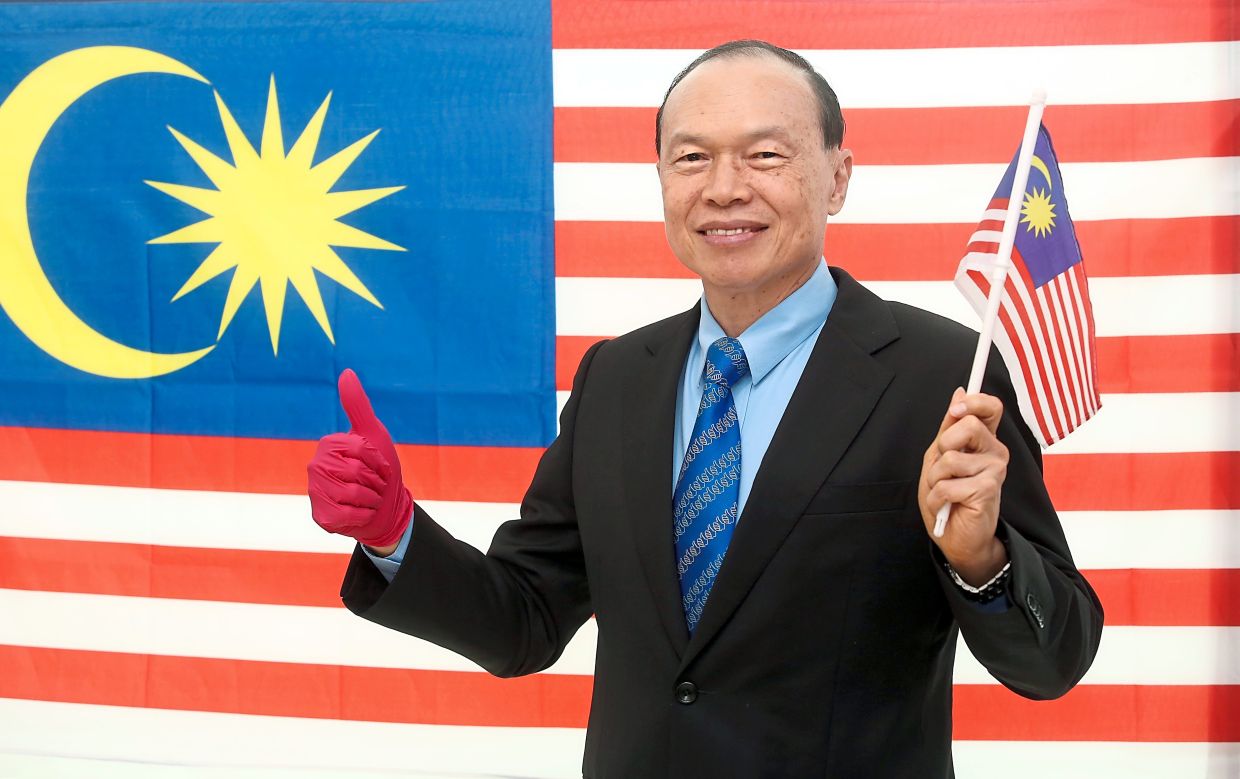
Making Malaysia proud: All eyes are on Lim and Top Glove’s performance next – will it set a new record in the stock market? — Filepic
The gloves are off as Top Glove moves up the stock exchange, beating banks along the way. The bet is on whether it will be in the number one spot soon.
MALAYSIAN businessman Tan Sri Lim Wee Chai is certainly the man of the hour. He is going places no Malaysian tycoons have.
The boss of Top Glove Corporation Bhd, the world’s largest gloves manufacturer, has found his company placed as third largest market capitalisation listed on Bursa.
On Thursday, Top Glove was in second spot, but it slipped to third when Bursa closed on Friday, with Public Bank taking over.
Pole position is still Maybank’s, which had a market capitalisation of RM88.244bil, against Top Glove’s at RM70.466bil on Thursday. Maybank’s share price closed at RM7.85 on Friday against Top Glove’s RM25.44.
Top Glove was at No.9 on the Singapore Exchange on Thursday, outranking bigger names like Singapore Airlines and Capitaland Ltd even.
Top Glove is expected to create Malaysian history soon by announcing the biggest jump in quarterly profit for a listed company.
The surge of the company’s share price is being watched closely by many Malaysians. Likewise, Lim’s increasing wealth, which has grown by millions by the week.
The real-time world billionaire ranking now has Lim at 443 in a list of 2,095 of the world’s richest persons with a wealth of at least US$5.2bil (RM24bil) as at July 23.
The 62-year-old Universiti Malaya physics graduate and Tunku Abdul Rahman College alumnus is ranked Malaysia’s 14th richest person in this year.By now, many foreigners would have sat up and taken note of Lim and his incredible showing in the stock market due to the demand for his rubber products amid the Covid-19 scourge.
Most tycoons are either reclusive, eccentric, heavily guarded or flamboyant, but Lim checks none of the above.
Westerners and even those of us not familiar with his name, would be surprised by his modest lifestyle.
He is a strong supporter of Tzu Chi, like fellow tycoon Tan Sri Vincent Tan.
Tzu Chi, headquartered in Taiwan, is a Buddhist charitable organisation which has volunteers and supporters all over the world. Malaysia, with a million-strong following, is an integral overseas centre.
Lim has been involved in Tzu Chi’s fund-raising efforts for some years, thanks to his persuasive wife Puan Sri Tong Siew Bee, a full time and long-time Tzu Chi volunteer.
Sharing his experience of serving Tzu Chi, Lim said he could only raise RM36 on his first outing after walking the streets for two hours.
“Nobody knew me and few donated. But that frustration did not dampen my enthusiasm to carry out good and meaningful work, ” he said in an interview with The Star.
Despite having to manage a huge corporation for six-and-a-half days a week, Lim persisted in availing himself to attend Tzu Chi’s volunteer course to be a “qualified and certified” volunteer.
Those unfamiliar with the Tzu Chi way would be stunned if they saw a tycoon like Lim seeking donations in public places, where volunteers need to bow and thank donors and the people they help.
Tzu Chi volunteers consider it an honour and privilege to engage in charitable work. The organisation has even helped rebuild mosques and churches in areas affected by disasters.
Lim’s most distinctive feature is his constant reminder to his listeners – especially those meeting him for the first time and sharing a moment – to take care of their body to remain healthy.
It hasn’t been easy for me being a Penangite with a love for food that includes greasy carb favourites, of which Lim would surely disapprove.
Last week, he texted this writer to reveal that he has been a complete vegetarian for the past two years, adding that his wife and son are also vegetarians.
Rule number one – stay fit and healthy! That was his opening line at a talk given to entrepreneurs. It’s an important criterion for those wishing to achieve great goals in life.
“When you are sick, you don’t earn anything, and you continue to have to spend money on fixed expenses on top of medical costs. But when you’re healthy, you can add value every day, ” he said.
He also has a peculiar induction for all new employees – everyone receives a toothbrush, toothpaste, tongue cleaner and dental floss, and all staff are required to brush their teeth three times a day.
In an interview, Lim set a goal of staying healthy and living until 120 years old.
He reportedly told The Health digital magazine that placing a priority on mental and physical well-being has helped him build his wealth.
Lim has practised what he calls his “5 Quality Wells” since young – clean well, eat well, work well, exercise well and sleep well – which he believes to be the formula for a long, healthy and prosperous life.
The company also monitors the body mass index (BMI) of its staff and has a policy of not hiring smokers. It also has full time nutritionists to design the company’s cafeteria menu and advise its workers on suitable diets.
Lim exercises four days a week, which comprises two days of badminton and two more of evening golf, and on occasion, he plays table tennis, too.
Top Glove employees are also required to sign a pledge every year to vouch that they will not condone or be involved in corrupt practices, with all new staff required to attend compulsory training specifically focused on combating corruption.
It has been a tremendous journey for Lim and his wife, who started their company in 1991 with their entire savings of just RM180,000.
Failure was not an option, he said, since they had no backup plan.
Fortunately, with his parents owning a small rubber plantation, he was exposed to the rubber trade from early on, while growing up in the small town of Titi in Negri Sembilan.
It’s interesting how other tycoons also ventured into the rubber gloves business but gave up because of the small profit margin then.
However, Lim persevered, and today Top Glove controls 26% of the world’s rubber glove market with 43 factories worldwide and with an annual production capacity of over 70.5 billion gloves.
Lim is certainly a good entrepreneur to emulate. A couple of years ago, I invited him to share his thoughts and experiences with readers of The Star.On the eve of the talk, I decided to turn up at the venue to make sure the sound system and seating arrangements were in order, and I was surprised to see Lim rehearsing his lines on stage – 24 hours before the event.
This is a man who takes his work seriously and is driven by a goal. Yet, he remains down to earth with almost no extravagance one can think of.
Almost everyone, especially in Kuala Lumpur, Singapore and Hong Kong, is holding their breath to see how Top Glove performs next and if its shares will surpass the RM30 mark and set a new record for being on top.
This isn’t exactly a rags-to-riches tale, but certainly a fantastic story of a small-town man becoming one of the richest people in the world dealing with a commodity Malaysia knows best – rubber.